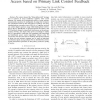1407 search results - page 26 / 282 » Cognition without content |
HICSS
2005
IEEE
14 years 3 months ago
2005
IEEE
This study extends the theory of Recognition Primed Decision-Making by applying it to groups. Furthermore, we explore the application of Template Theory to collaboration. An exper...
TWC
2008
13 years 9 months ago
2008
Spectrum sensing is the key enabling technology for cognitive radio networks. The main objective of spectrum sensing is to provide more spectrum access opportunities to cognitive r...
INFOCOM
2010
IEEE
13 years 8 months ago
2010
IEEE
—We venture beyond the “listen-before-talk” strategy that is common in many traditional cognitive radio access schemes. We exploit the bi-directional nature of most primary c...
ACII
2011
Springer
12 years 10 months ago
2011
Springer
We study the relationship between student carelessness and affect among high-school students using a Cognitive Tutor for Scatterplots, using a machine-learned detector of carelessn...
CORR
2008
Springer
13 years 10 months ago
2008
Springer
Abstract--We consider power control in cognitive radio networks where secondary users identify and exploit instantaneous and local spectrum opportunities without causing unacceptab...

